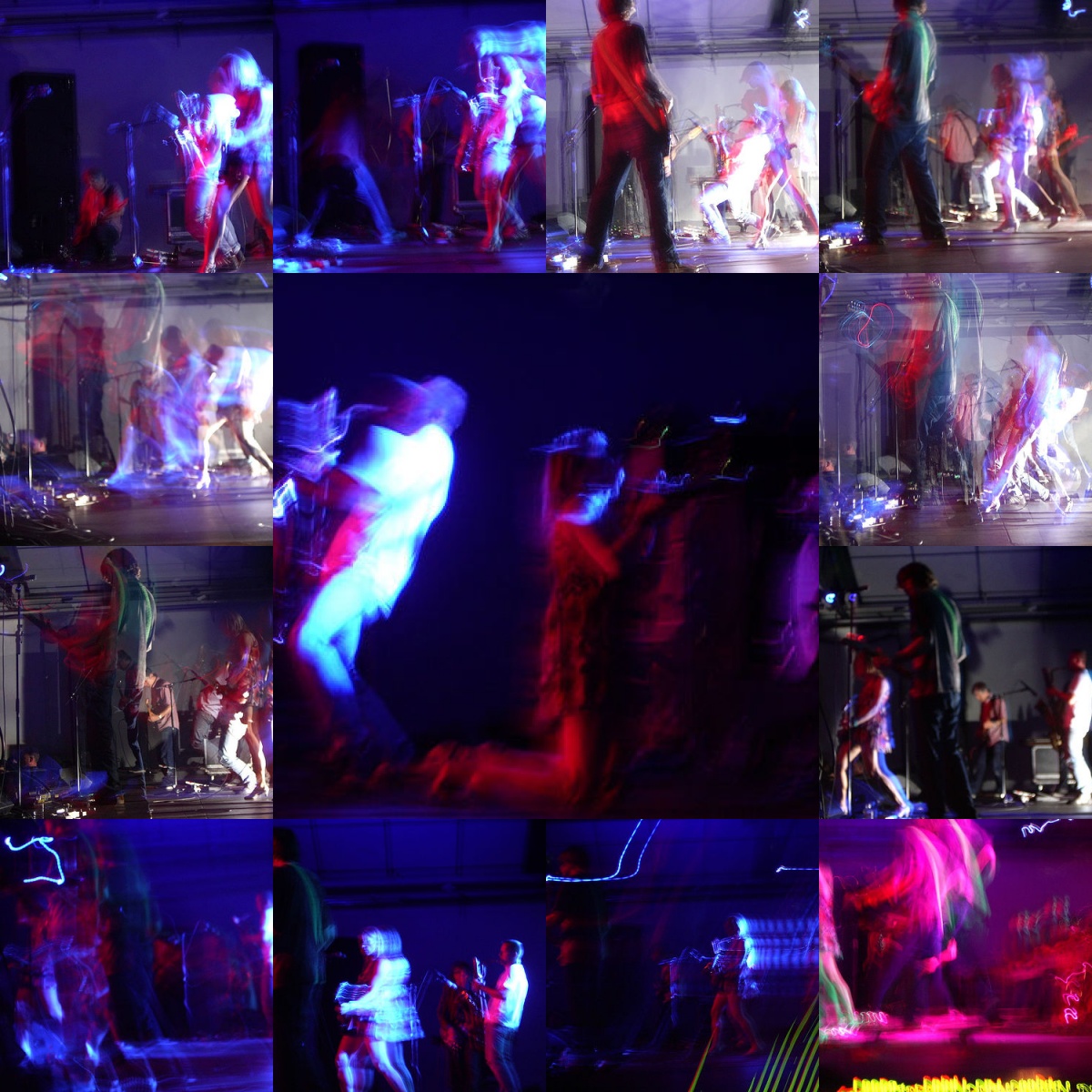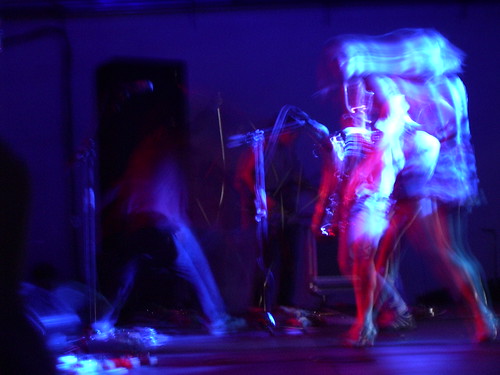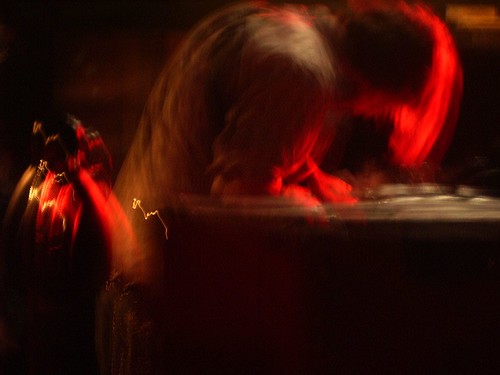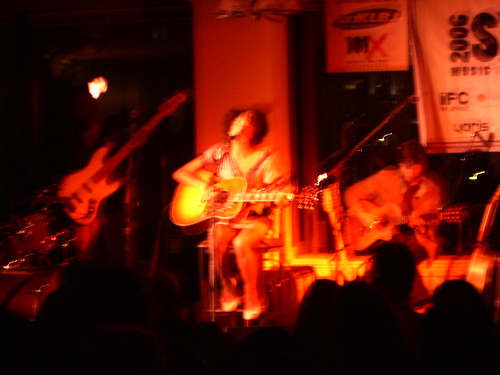
Tuesday, March 06, 2007
Monday, March 05, 2007
The White Stripes, Get Behind Me Satan
Welcome back, Jack.
There was almost a point, deep into Elephant, where you could sense something slipping away from Jack White. Not that The Whites Stripes’ fourth album didn’t impress, its hefty stomp and regal prowl evoking its animal namesake. On the surface, Elephant was perfect, down to the dust-to-digital production of Toerag’s Liam Watson. But there was an eerie emptiness at play, the blood splattered in Meg‘n‘Jack’s sibling scraps washed clean off the walls. Too little dysfunction.
Elephant sounded like The White Stripes making a White Stripes record, or at least what Q magazine et al, their newfound champions, defined as a White Stripes record. Classicism in the Zep/Beatles lineage was the order of the day, a studied retroism, tongue-in-cheek lyrical playfulness. What was missing, though, was the spook, the voodoo that fires Jack White into howling like a love-stung angel when he nears the mic. What made Die Stihl so refreshing, back in 2001, was not its ragged traditionalism, its craftsmanship, but rather the fervour with which Jack invested and infected these forms, a righteous fire that burned away years of studied cool and critical baggage and canonical familiarity, scorching to the very soul of a music re-awakened in their hands.
Seemingly using the ornery hide of Elephant to shield himself through the media shit-storm of what was surely the peak of White Stripes-mania, Get Behind Me Satan finds Jack throwing off the covers and revealing himself to be vulnerable and confused and, possibly, heart-broken. It’s the same Jack who tears into Dolly Parton’s ‘Jolene’ with not an iota of irony, just cutting deep to the bitter emotional bite of that song. And few can essay heartbreak with the brittle, cutting wit of a sulking Jack - as Jason Von Bondie learnt to his cost, White can be savage when cornered.
It opens with the single, ’Blue Orchid’, Jack’n’Meg pouring their jackhammer funk into a glitter ball-glancing, Glam-drenched disco-stomp that echoes similar noises ground out by DFA1979. For the record, Jack sounds like Emotional Rescue-era Jagger here, but not a bit as jaded. So far so (quality) indie disco. But track two, ‘The Nurse’, is where the fog creeps in, and things take a turn for the darker. Absent is Jacks plastic Sears guitar, replaced - as in much of the album - by piano and vibraphone. Until, that is, a most uncouth blast of distortion-hazed noise tears through, like a drunken, unwelcome visiting hoisting a brick through your window past the midnight hour. Clumsy and messy, like a hopelessly breaking heart, it intrudes on the track several times, arhythmically and with little artfulness, until it collapses into a barrage of bursts, like a corpse’s final flail. The result is to be left on edge, unsettled. Creeped thee fuck out.
What follows includes ‘Doorbell’, so naggingly catchy it could well be White Stripes’ own ‘Crazy Frog’ (there’s gold in them thar ringtones); the deliciously Big Star lament ‘Forever For Her (Is Over For Me)’; ‘As Ugly As I Seem’ painting the word ‘regret’ in gently Byrdsian tones; ‘The Denial Twist’, like Beck jamming with The Electric Mayhem; and the sick gothic country of ‘White Moon’. Then and only then do we commence …Satan…’s third, and darkest, side.
‘Instinct Blues’ is everything Elephant‘s ‘Ball & Biscuit’ should’ve been: bone lean and acid-fried blues, agitated by animal lust, and speared by atonal guitar freakouts and walls of frustrated din. There follows a bizarre and impenetrable nursery rhyme from Meg, a sorbet before ‘Take Take Take’, a truly startling song that bolts a tumbleweed strum to a heavy piano chorus, booming like something off a Morricone score, Meg thumping tympani with elan as Jack ponders the vampirish qualities of fame (the celeb in question being Rita Hayworth - good taste, Jack). Call the lyric Jack’s ‘International Jetset’, though the music itself, a grandiose tantrum, is more Dylan than dub, but a new beast all its own.
‘Little Ghost’, a morbid dustbowl ditty, is another brief segue, before perhaps Jack’s grisliest, most viciously odd song to date, and possibly his best. Slide guitar picks out an eerie melody, accompanied by toy piano and weary falsetto, tumbling into a brutal duel between Jack’s roaring guitar, slashing out a twisted-razor-wire blues, and his increasingly-unhinged vocal, like an insane preacher swollen with the spirit. Messy, eerie, chilling, it’s a murder ballad with evil seeped into its core, the lonely, desperate, snarling darkness of the blues.
‘I Ain’t That Lonely Yet’ is as sweet a closer as you could hope for, a fragile, gospel-infused note of hopefulness that somehow quells all the bared-fangs and broken hearts it follows. But the jagged edges are what you’ll remember and return to. Jack’s mastery of rock’n’roll was never in question but, as he sits and ploughs diesel-soaked Buicks of riff into moments of folk-hewed vulnerability, like a naughty boy attacking his sister’s teddy bears with a fearsome toy dinosaur, his ability to play out his heartaches, his inner dramas in such a flamboyant but still resonant manner, is confirmed.
(c) 2005, Stevie ChickScritti Hearts ATCQ
Green Gartside on A Tribe Called Quest’s Midnight Marauders
"I was living in
"Midnight Marauders is like a hip hop Sgt Pepper’s – it really repays repeated listening. One of its great strengths is its musicality, the way producer Ali Shaheed Muhammad programmed the beats, the samples he chose, the crunch of the crackly vinyl and the drums. Something shifts musically every 32 bars or so, a new loop or some new idea; the tracks develop almost like ‘proper songs’. Although, ironically, what I first loved about hip-hop is that it wasn’t like ‘proper’ songs, just voices and a drum-machine. Lyrically, they shifted perspective brilliantly, from rapping about getting a milk-shake to something like ‘Sucka Nigga’. Q-Tip’s voice is a trip in itself, and I loved all Phiphe Dawg’s dancehall references.
"Midnight Marauders got me back into the music room, getting away from writing ‘proper songs’. I had enough technology to sample some drums, getting that vinyl noise – the grit, the dirt – up front. That’s what led to Anomie And Bonhomie; I worked with Bob Power, who engineered Midnight Marauders, and Ali Shaheed Muhammad did a remix for a single, though I never actually met any of Tribe. I’d love to, though.
"I still play it all the time; we listened to it while packing up our gear in the rehearsal room the other night, and it gave us a sudden burst of energy. Our drummer’s 21, he knew all the lyrics, from growing up with it! It got me listening to some of DJ Premier’s old stuff, Nas’s Illmatic, the Jeru The Damaja shit – all of which changed my life. But they’re much harder albums than Midnight Marauders; I thought Mojo readers might better appreciate its musicality."
Clap Your Hands Say Yeah
In a nondescript London hotel bar, Alec Ounsworth shields his tour-worn frame behind dark sunglasses, flicked-up peacoat collars and strong coffee. A year ago, the Philadelphian never imagined he’d be touring Europe (even on a shoestring and no sleep); he’d just formed Clap Your Hands Say Yeah on a whim, visiting his sister in Massachusetts and bumping into guitarist Lee Sargeant, whose band were moving to Brooklyn. Ounsworth handed Sargeant a demo-tape, soon finding himself commuting five hours to New York to rehearse his songs.
“I’d been writing for ten years, since I was seventeen,” rasps Ounsworth, enthusiasm burning away a jetlag fug. “I had tried writing short stories, but it wasn’t for me. Music is like an umbrella of ideas, you can draw influence from everywhere, from Van Gogh, from Kubrick, from Raymond Carver, from anyone you want. Songs came naturally, in a way other writing didn’t. I had to get involved.”
Sentenced to piano lessons from an early age, Ounsworth stumbled across copies of Sergeant Pepper’s and The Freewheeling Bob Dylan in his parents’ collection when he was ten. Soon, he was visiting the record store on his own, buying albums because he loved the cover, or recognised names on the sleevenotes from other successful purchases.
“There’s a lot of different ways to branch off from The Beatles and Dylan,” he smiles. “The magical impression certain songs left upon me from childhood were more resonant than anything else.. Listening over and over, to those great rock albums, you work out why, say, ‘Astral Weeks’ sounds so perfect, so finished. You figure out what you need to put a great album together, subconsciously.”
Certainly, the group’s eponymous debut album, a glowing set of amber anthems, betrays the confidence, the ambition, the brilliance of a classic, its subtle, subterranean indie-rock accented by Ounsworth’s vocal, a vulnerable, keening oddity recalling David Byrne, Jeff Mangum and Jonathan Richman. Following a glowing 9.0 review on influential American website Pitchforkmedia.com, the album’s modest first pressing sold out; Ounsworth estimates current sales near the 40,000 mark, though he hasn’t checked the figures lately. The singer’s vagueness might be a symptom of tour fatigue, or it might be his way of handling being the biggest underground phenomenon since kindred spirit’s the Arcade Fire. The pressure of following up the debut doesn’t noticeably perturb the laconic front man.
“I have a backlog of demo tapes at home, enough for the next couple of albums, but they‘re not too well filed,” he grins. Before ducking out for another cigarette, another cardboard tumbler of caffeinated rocket-fuel, he pauses, considers those tapes. “It’ll be interesting to meet the me I was again, back when I recorded them.”
(c) Stevie Chick 2005Tapes'n'Tapes
YOU MIGHT have thought that the humble cassette-tape had gone the way of the 8-Track cartridge, a nostalgic relic from our Hi-Fidelity yesteryears. Josh Grier, however, begs to differ.
“Tapes are making a big resurgence,” he insists, over a Guinness in a Camden hostelry. “There are cassette-only labels, bands using cassette images for tee shirts and album covers - even kids who wear old cassettes as belt buckles!” And then there’s Tapes’n’Tapes, Grier’s bristling indie-pop quartet, tipped by some as the next Clap Your Hands Say Yeah, named in reference to “all these recording sessions we’d done on our 4-tracks, these piles of tapes’n’tapes’n’tapes of songs and ideas, cluttering up my apartment.”
The group formed in Minneapolis in 2003. “I always wanted to be in a band, it’s something I just couldn’t suppress,” laughs Grier. “Finally, when I graduated college, I thought, dammit, I’m going to start a band! And if it sucks, well, at least I tried.”
The first sessions began in Grier’s kitchen, using the oven-timer for a metronome. Grier and a buddy played shows backed by a CD-walkman playing drum tracks Josh had recorded (it even had a ‘blog’ on the group’s website), while housemate Matt Kretzmann, a trumpet and euphonium player, was taught to play the bass. “It was a challenge,” admits Matt, “But the fingering wasn’t actually all that different…”
Kretzmann later moved to keyboards while Jeremy Hanson (veteran of a blues covers band with his dad and brother since he was 8) took the drumstool. For their eponymous debut EP, self-released in 2004, Grier wrote and recorded a new song everyday. “Then I got carpal tunnel syndrome from playing my guitar too much,” he chuckles. “I have a lot of ideas that aren’t very good, left on the back-burner. There’s a lot of ‘filtering’ wheat from chaff.”
Bassist Erik Appelwick recorded their debut album, The Loon, last Summer. Unspooling with the literate pop savvy of Pavement and The Breeders‘ hazy invention, The Loon’s charms might never have escaped Minneapolis had the group’s manager Keri Wiese not leaked tracks to the online blogging community. The resulting buzz meant demand soon far outstripped the group’s fledgling Ibid Records imprint’s ability to supply; XL Records recently signed the group, and will be re-releasing The Loon worldwide in August.
“It all weirds me out more than I thought it would,” admits Grier. “The other day, we were filming a music-video on this huge soundstage, and I had to ask myself, ‘What do we think we’re doing??’ Our biggest ambition right now is just, to not fuck it all up, not make the ‘fatal wrong decision’. We just want to play the music we like, try out lots of new ideas, and,” stresses the man with tapes’n’tapes’tapes of discarded song ideas carpeting his floors, “Just not be redundant, you know?”
(c) Stevie Chick 2006




